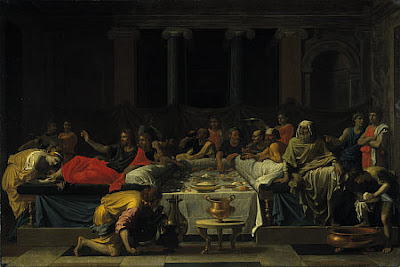Last year, as part of a series of posts on the topic of Remembrance, I posted the famous war poem "Dulce et decorum est" by Wilfred Owen. One of the comments I made on it was that it benefited from repeated reading.
Having revisited that post, I still believe it to be true, so I have decided to re-post it:
Dulce Et Decorum Est by Wilfred Owen
Bent double, like old beggars under sacks,
Knock-kneed, coughing like hags, we cursed through sludge,
Till on the haunting flares we turned our backs,
And towards our distant rest began to trudge.
Men marched asleep. Many had lost their boots,
But limped on, blood-shod. All went lame, all blind;
Drunk with fatigue; deaf even to the hoots
Of gas-shells dropping softly behind
Gas! Gas! Quick, boys! - An ecstasy of fumbling
Fitting the clunky helmets just in time,
But someone still was yelling out and stumbling
And floundering like a man in fire or lime. -
Dim through the misty panes and thick green light,
As under a green sea, I saw him drowning.
In all my dreams before my helpless sight
He plunges at me, guttering, choking, drowning.
If in some smothering dreams, you too could pace
Behind the wagon that we flung him in,
And watch the white eyes writhing in his face,
His hanging face, like a devil's sick of spin,
If you could hear, at every jolt, the blood
Come gargling from the froth-corrupted lungs
Bitter as the cud
Of vile, incurable sores on innocent tongues, -
My friend, you would not tell with such high zest
To children ardent for some desperate glory
The old Lie: Dulce et decorum est
Pro patria mori.
Also last year, I posted links to Carol Ann Duffy reading her poem "Last Post" which was commissioned by the Today programme.
Last Post by Carol Ann Duffy
In all my dreams, before my helpless sight,
He plunges at me, guttering, choking, drowning.
If poetry could tell it backwards, true, begin
that moment shrapnel scythed you to the stinking mud…
but you get up, amazed, watch bled bad blood
run upwards from the slime into its wounds;
see lines and lines of British boys rewind
back to their trenches, kiss the photographs from home-
mothers, sweethearts, sisters, younger brothers
not entering the story now
to die and die and die.
Dulce- No- Decorum- No- Pro patria mori.
You walk away.
You walk away; drop your gun (fixed bayonet)
like all your mates do too-
Harry, Tommy, Wilfred, Edward, Bert-
and light a cigarette.
There's coffee in the square,
warm French bread
and all those thousands dead
are shaking dried mud from their hair
and queuing up for home. Freshly alive,
a lad plays Tipperary to the crowd, released
from History; the glistening, healthy horses fit for heroes, kings.
You lean against a wall,
your several million lives still possible
and crammed with love, work, children, talent, English beer, good food.
You see the poet tuck away his pocket-book and smile.
If poetry could truly tell it backwards,
then it would.
Andrew
 As I've previously mentioned on these pages, I am a fan of True Blood. I may not have thought to read the books, however, if it were not for the recommendation of a friend.
As I've previously mentioned on these pages, I am a fan of True Blood. I may not have thought to read the books, however, if it were not for the recommendation of a friend.

















